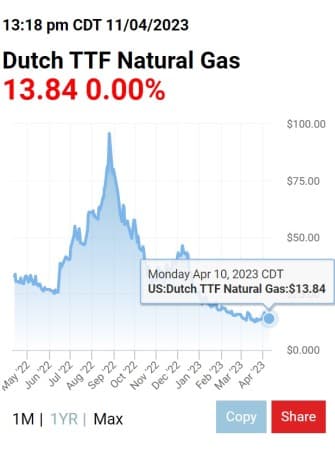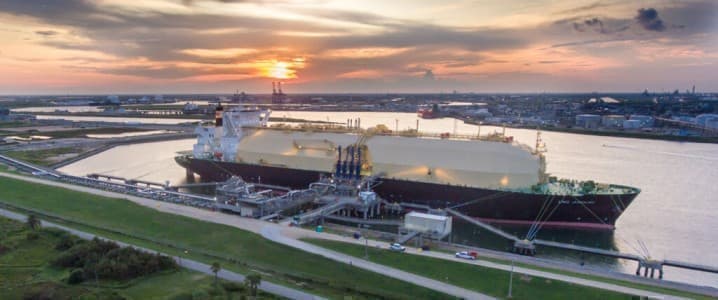The current optimism in Europe about future energy security is once again based on the wrong assessments. An increasing amount of reports published during the last couple of weeks are warning that if Europe is not getting its act together, it could be facing a possible new energy crisis or at the very least a repeat of very high prices during the winter of 2023-2024.
The exceptionally warm winter of 2022-2023 has been a blessing for EU governments and consumers alike, but it should not be considered a reliable indicator for the future. Despite significant investments in rapid LNG regasification and landing projects, little attention has been paid to global developments which suggest that demand for natural gas will continue to rise, but also that countries like China, India, Japan, and South Korea are increasingly seeking long-term LNG supply contracts. The combination of increased Chinese demand and strong Indian economic growth will further tighten global markets and cause LNG prices to rise. Meanwhile, Russia’s remaining LNG supply to Europe and gas flows through Ukraine could face significant challenges, including potential blockades if Ukraine launches an offensive or attacks Crimea. As a result, existing Russian LNG deliveries to Europe, including Rotterdam and other ports, are also likely to end soon. Going forward, securing sufficient LNG supplies through purchases on the global market will be a high priority for Europe if it wants to counter curtailed Russian flows. Maintaining 2022 levels of imports won’t be easy. Last year, Europe imported 121 million tons of LNG, which was a 60% increase compared to 2021. The cost of this sudden change in energy import strategy has been extremely high, as Europe has been scouring international spot markets for cargoes, paying top dollar for cargoes. Non-European entities, such as China, have been opting for an alternate approach, prioritizing long-term agreements. Although such agreements have grown more expensive, they have helped curb price surges. And high prices remain a concern for Europe. In 2022, European buyers represented approximately 33% of total LNG spot market purchases, a significant increase from 13% in 2021. Unless long-term contracts are inked, it is anticipated that Europe's LNG spot-market volumes will surge to around 50% in 2023-2024.
Related: Russia's Current Account Surplus Dwindles As Sanctions Hit
The main cause of the current fledgling LNG and natural gas import strategies is linked to existing and proposed EU policies. Brussels’ climate goals are seen as the main culprit constraining long-term contract discussions at present. The plan to cut 55% of emissions by 2030, while reaching net-zero by 2050, negates the options available to market parties to sign long-term contracts. While long-term contracts could be mitigating price hikes and ultimately lead to lower natural gas prices for consumers, policymakers are prioritizing climate change and emission strategies, leaving affordability for final consumers at the bottom of the agenda. As Morten Frisch, a senior partner at Morten Frisch Consulting states that Europe will need to put 70-75% of its LNG supply under long-term sale and purchase agreements (SPAs). Frisch reiterates that current EU politicians are misinterpreting the real facts on the ground as they all claim that green hydrogen could be replacing LNG volumes by 2030, which looks like a long shot at present. Due to the green lobby and green hydrogen market pushers, the EU becomes extremely dependent on spot-market LNG supplies, and vulnerable to price shocks.
The real underlying issue is that European policymakers are underestimating the importance of natural gas as a bridge fuel. While the debate in Brussels about demand reduction and the effective horizon for phasing out natural gas continues, policymakers don’t seem to be aware that affordability and security of supply are of crucial importance. An increase in Asian LNG demand could leave global LNG markets increasingly tight and could lead to new price shocks during the winter of 2023/2024.
LNG spot prices have come down 80% from their peak levels in 2022, but many analysts now expect prices to increase again, not only because of Asia, but also due to summer demand, as hydropower levels are set to drop. In order to avoid the negative consequences of another price shock, EU planners must start to hedge risk through long-term contracts.

During the last couple of weeks, European energy giants such as Shell and RWE have been reaching a stalemate in long-term contract negotiations with LNG supplier QatarEnergy. RWE, for example, is said to be at odds with QatarEnergy, based on the length of the proposed deal. Doha is looking to close a 25-year supply deal, while German parties only want to commit to 10-15 years, in line with the German goal to phase out natural gas completely by 2043. Doha could be willing to sign short-term contracts but at a hefty premium. The German example doesn’t stand on its own, as other major gas importers, such as the Netherlands, aren’t willing to commit to longer contract periods either. The short-term contracts may lead to the accomplishment of certain climate goals, but the consumer is bound to foot the bill for these policies.
By Cyril Widdershoven for Oilprice.com
More Top Reads From Oilprice.com:
- Oil Prices Return To Recent Highs
- OPEC+ Oil Production Sees Biggest Drop In 10 Months
- Russia Delivers 30,000 Tons Of Fuel To Iran Via Rail



















The EU will continue to pay steep prices for LNG in the spot market because of rising LNG demand from Asian economies and also because major Asian importers like China, India, Japan and South Korea are increasingly opting for long-term LNG supply contracts. The EU is also continuing to pay exorbitant prices for US LNG supplies estimated to be 3-4 times higher than the price the US sells LNG in the domestic market.
As dictated by their green policies, the EU isn’t inclined to sign long-term LNG contracts and therefore it has no alternative but to pay excessively high prices in a market getting tighter.
Dr Mamdouh G Salameh
International Oil Economist
Global Energy Expert